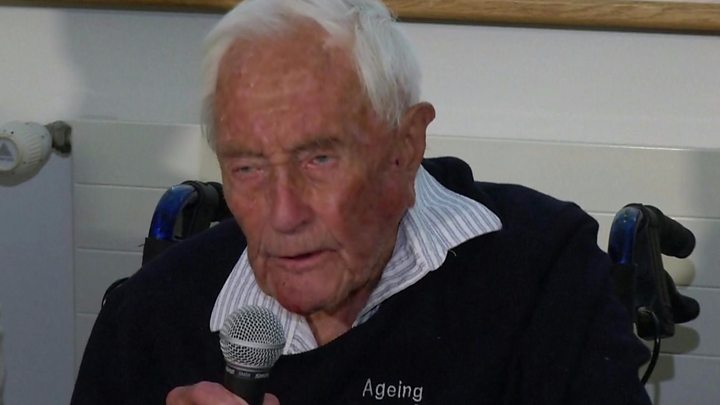
Scientist David Goodall, 104, has died after choosing to end his life at a clinic in Switzerland, a right-to-die organisation says.
The lauded ecologist and botanist, who was not terminally ill, said the decision had been driven by his deteriorating quality of life.
Mr Goodall had flown from Australia for his assisted suicide, attracting the attention of people around the world.
In his final public appearance, he said the public interest had surprised him.
"I no longer want to continue life," he told reporters on Wednesday.
"One wants to, at my age, even rather less than my age... to be free to choose death when the death is at an appropriate time."
The London-born academic died "peacefully" at 12:30 (10:30 GMT) in Basel, from an infusion of Nembutal, a barbiturate, said Philip Nitschke, founder of Exit International, the group which helped him take his own life.
What was David Goodall known for?
Mr Goodall had lived on his own in a small flat in Perth, Western Australia, until only a few weeks before his trip to Switzerland.
He stepped back from full-time employment in 1979, but remained heavily involved in his field of work.
Among his achievements in recent years, Mr Goodall edited a 30-volume book series called Ecosystems of the World and was made a Member of the Order of Australia for his scientific work.
In 2016, aged 102, he won a battle to keep working on campus at Perth's Edith Cowan University, where he was an unpaid honorary research associate.
Mr Goodall said he resented having to leave Australia to end his life. Assisted dying is legal in only one state, but eligibility requires a person to be terminally ill.
Meanwhile, Switzerland has allowed assisted suicide since 1942.
Where else is assisted dying allowed?
Assisted suicide describes any act that intentionally helps another person kill themselves, for example by providing them with the means to do so, most commonly by prescribing a lethal medication.
It differs from euthanasia, which is a third-party intervention to end a life to relieve suffering, such as when a doctor administers the lethal dose.
- In Switzerland, assisted suicide is allowed only if the person assisting acts unselfishly. It is the only country with centres offering assisted suicide to foreign nationals
- The Netherlands, Belgium and Luxembourg permit euthanasia and assisted suicide. In the Netherlands and Belgium, euthanasia is available to minors in specific instances
- Colombia allows euthanasia
- Six US states - Oregon, Washington, Vermont, Montana, California and Colorado - permit assisted dying for terminally ill patients. The US capital Washington DC implemented a similar law for the city's residents in 2017
- Canada followed the province of Quebec in permitting euthanasia and assisted suicide in 2016